address by Chris's sister Susie at the interment of his ashes in the churchyard of St Mary and St John's church, Cowley Road, Oxford, 9th August 2005It’s very good to see Chris’s friends here today. Thank you for honouring us, and Chris, with your presence. The 14 months since Chris died so suddenly have been something of a journey, made all the more bearable by all the support of the people who were close to him in Oxford.
Today we are gathered in the final stage of laying Chris’s remains to rest, although I find his spirit is still very much present and is a source of inspiration and reassurance. St Mary and St John’s is such a fitting place for this ceremony, in the heart of the area that Chris knew and loved, and that knew him so well in return. Chris was a familiar character in the area with his inimitable walk, that he described in one poem as “my mad Marionette walk”.
I tread delicately
Down the street
Cat-like, a lemur
In a William Burroughs novel.
When I contacted the vicar Adam Romanis to see if it would be possible to inter Chris’s ashes here, he was very welcoming and said the church had recently put aside an area for the burial of ashes. St Mary and St John’s was a special place for Chris, as we see from his poem “Boxes” that Veronica will be reading.
When I came here to meet Adam I was immediately taken by the atmosphere of the church and churchyard and of the wonderful work the team of volunteers has done to restore the churchyard without damaging the unique character of the grounds and the trees that Chris wrote about in his poem. Look at an aerial photo and you will see that the Victorian churchyard is indeed a green lung in East Oxford. The church is a focal point of regeneration, and Chris among the wild flowers will be playing his part. I left a copy of the dossier of Chris’s poems and pictures with Adam, and when his churchwarden saw it she immediately recognised Chris and remembered his coming to services here on several occasions.
Today would have been Chris’s 54th birthday. He was almost surprised, and certainly delighted, to have made it to 50 in 2001.. He was like a star that burnt itself out too brightly.
Chris’s health had never been robust. He was born three weeks premature, which in 1951 was more serious than it is now in the days of hi-tech incubators. Our mother used to tell us how the doctor had warned her in his Scottish accent that Chris might not survive with: “Well Mrs Baily sometimes they do, and sometimes they don’t do.” Thankfully Chris did do, although he had a mysterious diet of sour milk as a young baby which may not have done him much good. As a chubby girl of seven or so I used to envy the big jars of malted treacle-like Virol which were fed Chris by the heaped spoonful to try to encourage him to put on weight.
Chris’s talents showed themselves at an early age. Even when we were very young and doing stick like figures I was aware how good his drawing was. He was amusing and loved doing puppet shows. We often had to go next door to our father’s office to get the office boy Roger to untangle the strings of our marionette puppets. One of those ex-marionettes, a golliwog, used to be in his room as some of you may remember.
Chris’s humour was always apparent. Our father’s solicitor’s office wasright next door to our house One day a client came looking for Mr Baily. “Go up the stairs” Chris told him, “And when you see a man as big as two dustbins put together that’s him.”
After our parents split up in 1958 Chris and I left Chichester and went to live with our grandparents in Glastonbury. There we benefited from our numerous cousins who lived there or visited, from the big garden of the Thatched Cottage, and our four aunts and our uncle. Chris was a professorial little boy with his love of knowledge; Arthur Mees encyclopaedias, and Look and Learn magazine, his Stanley Gibbons stamp catalogue, his Victorian bun pennies and endless search for the priceless 1933 penny.
He was musical and at the age of about 15 had Sidcot School transfixed on a parents’ weekend with his performance of Khachaturian’s Toccata. And after our older brother Johnny showed him how to play blues he was the blues maestro of the school. He was a memorable Mole in Wind in the Willows, having to say “scrape, scrabble, scratch” or words to that effect as he borrowed his way on the stage in the opening scene.
All this talent and sensitivity had a downside, as it has with so many writers and artists. Chris’s doors of perception were flung wide open and he risked being submerged by the flood of impressions, emotions and stresses exacerbated by family upheavals. When he was only 15 he suffered his first serious depression – something which in those days was virtually unheard of in one so young - and had to take a long time off school.
As Chris would do so many times subsequently, he showed courage in ‘coming back’ from periods of darkness. When he had recovered from this first depression, he went to Midhurst Grammar school in Sussex with its inspirational headmaster Mr Lucas and wife Vera who particularly cultivated Chris’s love of the French language and culture.
One of his friends from those days, Chris Matthews, sent me an e-mail from Canada after Chris’s death saying:
“My memories of him were and still are of a kind, generous and sensitive soul. While we had pretensions of being clever and showed off our knowledge, he had a quiet knowledge that was much more genuine. I am glad I was a part of his happy memories and hope that I contributed to his life as he will always remain as a soft spot in my heart. I remember the ‘O’ level celebrations under the tent at Cowdray ruins, we had a bottle of vile wine or cider and pretended to enjoy it at 16, it was a lark which we got away with. I have spent a couple of hours raising a glass to him remembering his ability to write and always being amazed at how neat his English papers and how clever he was, in comparison to me.”
Chris Matthews memories of Chris chimed with the words that so many have used of him: kind, generous, sensitive and clever.
As our uncle H wrote to me in an e-mail from Tokyo last week: “Yes, I miss Chris’s powerful memory and brain and humour…A thought for him at the interment of the ashes…We should have been able to find a way to work together. He and I tried, at one point at an early stage with the Robot and the Emperor, and then we lost direction. That was in Glastonbury 1986 roughly. We used to stroll down the town after working and he would order a Newcastle Brown..methinks. He was I though the cleverest of us all, certainly leagues ahead of my ignoble self.
As part of his degree course at the University of East Anglia Chris spent time in 1973 Paris where H was living with his Japanese wife in 1973. H left Chris with her“I had left her with him as a sort of guardian, a strategy that might seem daft to other members of the family, but I had confidence in his judgement.” And the judgement was not misplaced; H was impressed when Chris telephoned him in California and told him he should come back as his wife was feeling very lonely.
Chris was a source of wisdom and good sense, despite his own problems. One of his closest friends here in Oxford described him as a “wise child”. And he never lost that child’s sense of wonder. I remember it from when he was very small, and when we went on holidays to the seaside he would run to the waters edge a skinny form in his swimming trunks and, excited by the sight of the waves would wave his arms up and down.
Chris went on creating art works, and the last years of his life were particularly productive in terms of the poems, diary entries, postcards, paintings and pottery that he generated. He left us a rich legacy of his work, some of which we collected in the “dossier” that some of you have seen. I am told that a few weeks before he died, he told a friend “my sister should publish my diaries”. Well I don’t know about that Chris, they will need some editing, possibly censoring, but at least I now have many of his poems and paintings on computer and hope one day we may do a bigger dossier.
Place was very important to Chris. The places of his childhood, Glastonbury, Chichester figure large in his poetry. And here we are in the midst of Chris Baily territory, just up the road from the Excelsior where he came almost every day for years for its welcoming atmosphere, good home cooking, interesting mix of people, under the proprietor Andrew, and Costa, and – if this is not a plug too far – what he thought was the best coffee in Oxford.
Further down Cowley Road is the Mill Day Centre and its poetry magazine the Millwheel which features poems and drawings by Chris and others and accounts of trips outside Oxford. It was a friend from the Mill, Mary, who drove Chris all the way down to Somerset for our mother’s funeral, with his newly neat hair, dressed in a suit and even carrying a brief case.
Chris lived in various places including St Clements, and in the Mind House in Regent’s Street. In more recent years he had lived up at Rose Hill, in Rose Hill flats. Although he talked sometimes of moving, for reasons we know too well – the children in particular were not kind to people who were ‘different’ - yet he was settled there.
Chris appreciated the Cowley Road music scene, and was chuffed that local bands like Supergrass and Radiohead went on to success. In fact I see Cowley Road even has an entry of its own in that indispensable on-line people’s encyclopaedia Wikipedia. Chris enjoyed the cosmopolitan character of East Oxford, and knew great kindness from Pakistani Muslim shopkeepers. There was Mr Khan in Bullingdon Road, just round the corner from Regent Street. Up in Rose Hill the couple Chris called Mr and Mrs Joe ran the local newsagents.
Chris relished the life of the various hostelries of the area. For a time his regular haunt was the Coach and Horses in St Clements, and he loved taking the landlord’s dog Coach for walks in Angel Meadow. After it closed, he switched his allegiance to the The Half Moon. Chris loved writing postcards, and they would often begin “I’m writing this in The Half Moon.”
He also loved nature in Oxford and was a great walker. Once when his twin uncles and I went to see him at the Warneford he took us for a walk in the grounds, down the river, and identified the trees as alders, which he said are the beginning of the DH L Lawrence The Rainbow.
Yet Chris had come to Oxford almost by accident, He had become ill after doing his MA in French literature – his subject the surrealist Belgian-born poet and artist Henri Michaux. He had been working on the famous magazine Adam edited by the legendary Romanian Jewish publisher Miron Grindea when he became ill and spent a time in St Francis ' hospital in Haywards Heath, and the in Glastonbury. Some of his most vivid paintings date from this period, in 1977.
My grandparents arranged for him to come to the Richmond Fellowship’s Rutland House that was intended to be halfway house in a therapeutic community. He ended up living here for not far off 30 years, and most of that was here in East Oxford.
At that time I had started work on a magazine in London called Arab Report and Record and when I found out they wanted someone to do an index I suggested Chris. He did a superb, meticulous job with his index card system keep as I remember under his bed in Rutland House. The editor of the magazine was most impressed. With his fabulous memory, Chris would for ever after remember the names of all the Middle East politicians, and enjoyed come out with them. At one time he worked at Vacation Work, at another at Restore that did lovely silk screen print cards, but the starting time was rather too early for Chris’s taste.
Oxford suited Chris very well. It had everything he could have wished for – architecture, culture, the Ashmolean (whose keeper of Western Art Kenneth Garlick had been taught Latin by our grandfather in Somerset), Museum of Modern Art, Blackwell’s book shop - and yet all on a much more manageable scale than say London would have been.
Above all, Chris benefited from the wider community and from the networks of friendships and support that he established, many of them maintained for years.
As for the more formal Care in the Community, it gets an unfairly bad press, and seems only to be mentioned when something goes wrong; the efforts made by so many go unremarked. We know of the dedicated people here in Oxford who worked with Chris on a professional level, and many of whom became friends.
.JPG)
+unbordered.JPG)



.JPG)


.JPG)

.JPG)

.JPG)
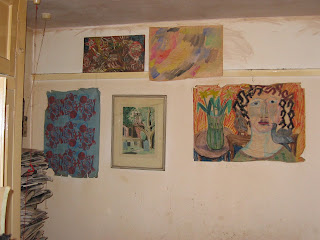






.JPG)
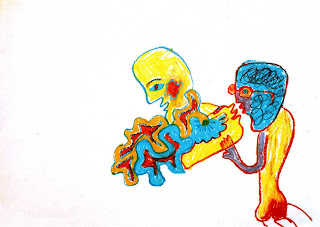
.JPG)

+retouched.JPG)
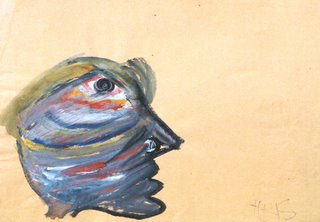


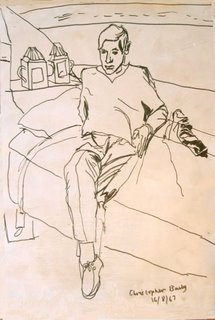
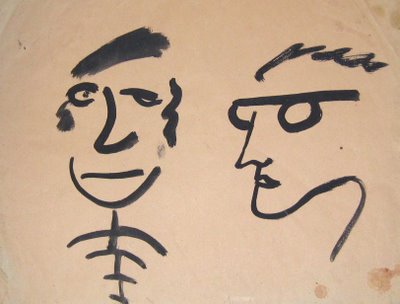
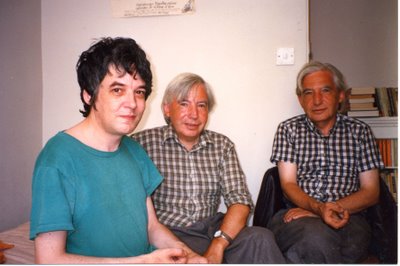
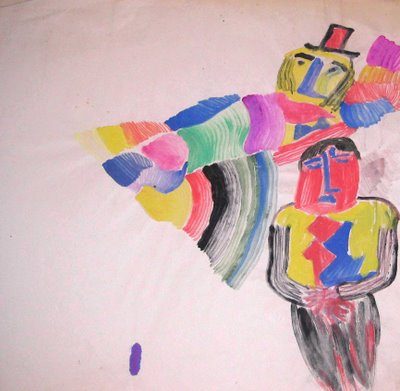


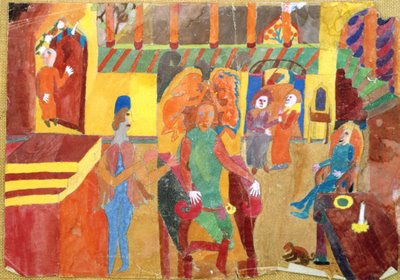



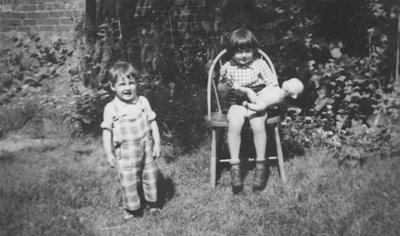



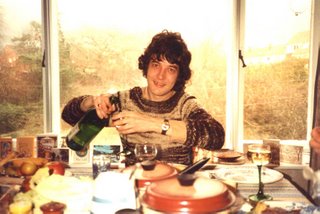

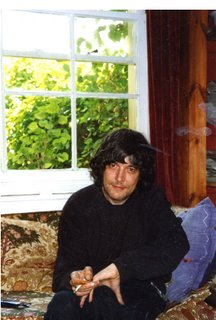


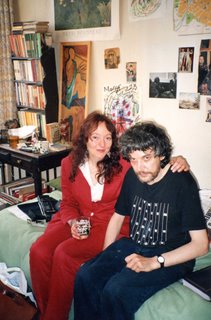
.JPG)